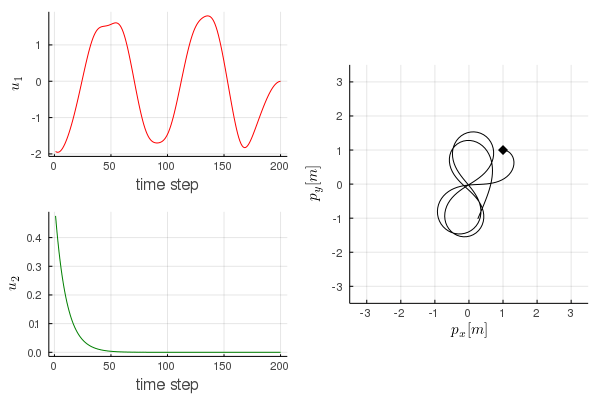iLQGames.jl
Rapidly designing and solving differential games in Julia.
iLQGames.jl
iLQGames.jl is a framework for rapidly designing and solving nonlinear general-sum differential games, built around iterative linear-quadratic game approximations.
A brief introduction to this framework and benchmarks against a C++ implementation can be found in this short workshop manuscript. Finally, this paper demonstrates the flexibility and performance of iLQGames.jl by combining it with a particle-filter scheme to reason about uncertainty in differential games in real-time.
Installation
Within the Julia REPL run:
using Pkg
Pkg.add(PackageSpec(url="https://github.com/lassepe/iLQGames.jl"))
Example
Here is an example of two players controlling a single 4D-unicycle. Player-1 controls the steering, Player-2 controls the acceleration.
1. Describe Dynamics
We define a Unicycle as a subtype of our ControlSystem type and implement the
differential equation by overloading dx for our type.
using iLQGames
import iLQGames: dx
# parameters: number of states, number of inputs, sampling time, horizon
nx, nu, ΔT, game_horizon = 4, 2, 0.1, 200
# setup the dynamics
struct Unicycle <: ControlSystem{ΔT,nx,nu} end
# the differential equation of a uncycle with state: (px, py, phi, v)
dx(cs::Unicycle, x, u, t) = SVector(x[4]cos(x[3]), x[4]sin(x[3]), u[1], u[2])
dynamics = Unicycle()
2. Setup Costs
To setup the costs encoding each players objectives, we can derive a custom subtype
from PlayerCost, or, as done here, simply hand the cost function as a lambda function
to the FunctionPlayerCost.
# player-1 wants the unicycle to stay close to the origin,
# player-2 wants to keep close to 1 m/s
costs = (FunctionPlayerCost((g, x, u, t) -> (x[1]^2 + x[2]^2 + u[1]^2)),
FunctionPlayerCost((g, x, u, t) -> ((x[4] - 1)^2 + u[2]^2)))
# indices of inputs that each player controls
player_inputs = (SVector(1), SVector(2))
3. Solve the Game
With this information we can construct the game…
g = GeneralGame(game_horizon, player_inputs, dynamics, costs)
…and solve it for some initial conditions x0.
Automatic differentiation will save us from having to specify how to compute LQ approximations of the system.
# get a solver, choose initial conditions and solve (in about 9 ms with automatic differentiation)
solver = iLQSolver(g)
x0 = SVector(1, 1, 0, 0.5)
converged, trajectory, strategies = solve(g, solver, x0)
Finally, we can visualize the path of the unicycle as follows (x- and y-position):
# for visualization we need to state which state indices correspond to px and py
position_indices = tuple(SVector(1,2))
# Note: you can use the `plot_traj` call without @animated to get a non-animated plot instead.
@animated(plot_traj(trajectory, g, [:red, :green], player_inputs),
1:game_horizon, "minimal_example.gif")
At the equilibrium solution, Player-2 accelerates to reach the desired speed. Player-1 steers the unicycle in a figure-8 to stay close to the origin.:


